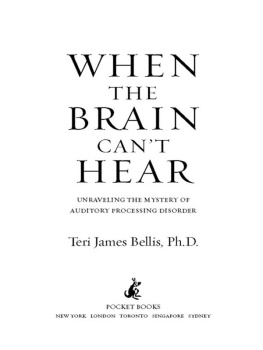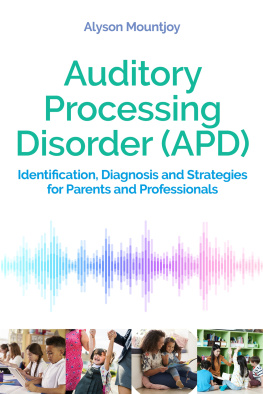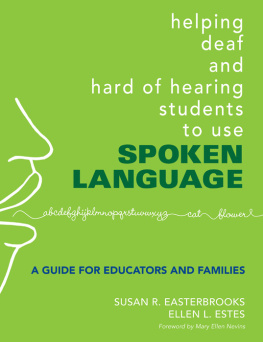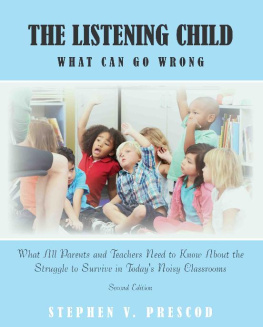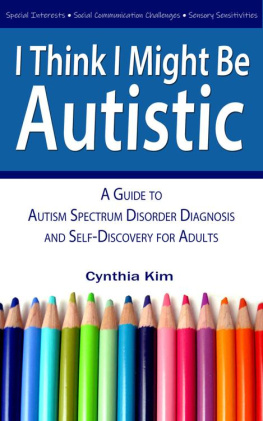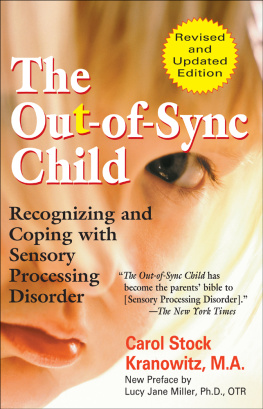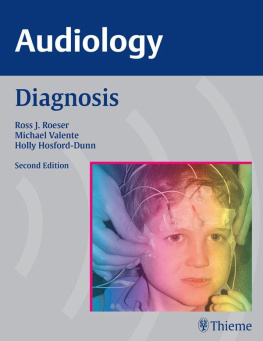POCKET BOOKS, a division of Simon & Schuster, Inc. 1230 Avenue of the Americas, New York, NY 10020
Copyright 2002 by Teri James Bellis, Ph.D.
All rights reserved, including the right to reproduce this book or portions thereof in any form whatsoever.
For information address Pocket Books, 1230 Avenue of the Americas, New York, NY 10020
Bellis, Teri James.
When the brain can't hear : unraveling the mystery of auditory processing disorder / Teri James Bellis.
p. cm.
1. Word deafnessPopular works. I. Title.
POCKET and colophon are registered trademarks of Simon & Schuster, Inc.
ACKNOWLEDGMENTS
I N SPORTS, THERE ARE halls of fame that recognize those players who have contributed the most, scored the greatest number of points, and changed the course of history through their effort, talent, knowledge, and sheer determination. If there were a hall of fame to honor the professionals and scientists who have shaped our current conceptualization of auditory processing disorders (APD), the walls would be lined with names such as Gail Chermak, Jeanane Ferre, Jack Katz, Robert Keith, James Jerger, Frank Musiek, Jack Willeford, and many more. These are the people who have laid the stones on the circuitous path toward unraveling the mystery of what happens when the brain can't hear. I am indebted to their years of contribution and dedication to the field, and this book could never have been written without them.
Of these, three in particular have been invaluable to me both personally and professionally, and I am proud to call them colleagues and friends. Without question, Dr. Frank Musiek, Director of Audiology and Professor of Otolaryngology and Neurology at the Dartmouth-Hitchcock Medical Center in Lebanon, New Hampshire, has contributed more to our understanding of how lesions or dysfunction in specific brain regions affect auditory processing than anyone else in the field. He has also had the greatest influence on me, personally, by taking me under his wing several years ago and filling my brain with all of the basic knowledge upon which I have built in the years since. To this day, Frank remains a valued friend and mentor. There is no doubt in my mind that, if not for him, I would not be where I am now, doing something I love so much. He was the first to believe in me, and I hope my subsequent work has proven me worthy of that belief.
We owe our current knowledge of how higher-order metacognitive and metalinguistic factors affect auditory processing largely to the efforts of Dr. Gail Chermak, Distinguished Professor of Audiology and Chair of the Department of Speech and Hearing Sciences at Washington State University, Pullman. Her work has made all of us look at information (especially spoken language) processing in its entirety and acknowledge the need to consider both bottom-up and top-down factors in assessing and managing APD. Personally, Gail has done far more than she realizes to make me feel welcome in this field. She is always approachable and supportive, never ego-bound, and is such an engaging speaker that I could listen to her for hours without a hint of boredom. As a role model, Gail represents a standard of personal and professional integrity and accomplishment to which I can only hope to aspire.
Last, but certainly not least, is my partner in crime, Dr. Jeanane Ferre of Oak Park, Illinois, without whom, frankly, there would be no Bellis/Ferre model of APD. As one of the only professionals in the country, whose private practice consists solely of assessment and management of APD, she has done much to further our understanding of the relationship between auditory processing and language, learning, and communication. A close friend as well as a colleague, Jeanane has always been there to help me through the crises and applaud my successes. She also happens to be the only person who can put up with rooming with me at national conventions, which says a lot about her personally. Jeanane likes to say that she and I are of such like minds that we share one brain. I thank her for letting me use it during the writing of this book and promise to return it to her when I am finished.
So many others have assisted me in countless ways that I cannot possibly mention them all. I would, however, like to thank my agent, Jodie Rhodes, for taking a fledgling idea that I had been considering for years and guiding it to a level of fruition that I could never have dreamed possible; Tracy Behar, my editor at Pocket Books, who recognized the importance of this topic and trusted me to address it adequately; Brenda Copeland, associate editor at Pocket Books, who had the day-to-day task of trudging through pages and pages of drafts and E-mails and who always managed to make editorial suggestions that were not only insightful and improved my writing immeasurably, but were gently couched so as not to bruise the author's delicate ego; and Renee O'Connor and Tracy Olinger, both of whom read initial draft chapters and made valuable suggestions for strengthening them.
I am also grateful to my students and fellow faculty and staff members in the Department of Communication Disorders at the University of South Dakota, who never once complained during the frantic months when I was trying to fulfill my full-time obligation to them, write this book, and keep my sanity all at the same time. Instead, they were always ready with words of support and shoulders to lean on when the wild, panicked look in my eyes became frighteningly apparent.
For always reminding me of why I do what I do, I thank all of my patientsadults and childrenwith APD and their parents and loved ones. Their letters of gratitude, support, and encouragement mean more to me than any amount of professional success. I especially thank Jayna Newell and her son, Benjamin, who traveled across the country just to have lunch with me and share their story of frustration and, most importantly, success in coping with APD.
Finally, this book is dedicated to those who suffered the most during the writing of it: my husband, Tim, who read every word I wrote, compiled glossary terms, performed secretarial duties, cooked, cleaned, did the laundry, shuttled the kids from place to place, endured stress attacks and wild mood swings (mine, not his), yet still found the energy to say I love you at the end of every day; my daughter, Jennie, who had to entertain and watch over her brothers for months on end; and my sons, Chris and Danny, who heard the words Don't bother Mommy, she's working right now far more often than any little boys should ever have to hear. Always, they are the light that beckons to me from the end of the tunnel and the wind at my back that speeds me along.
PREFACE
WALKING A MILE IN THEIR SHOES
I HAVE A BULLETIN board on the wall across from my desk. On it is a letter I received from the mother of a child with an auditory processing disorder (APD). For most of his young life, Jonathan had struggled with listening, learning, and communicating. Like a child with a hearing loss, Jonathan often had difficulty hearing what was being said, especially if there was a lot of noise around him. He couldn't tell the difference between certain speech sounds or connect them with the appropriate letters of the alphabet, so he couldn't read or write well. He had a hard time following directions and understanding information in school. Until quite recently, I had never actually met Jonathan face-to-face. But I felt as if I knew him well. His mother, Jane, and I had been in communication off and on for several years. I had reviewed Jonathan's records and test results and had made suggestions for treating his APD, educating his teachers about the disorder, and coping with the disorder at home. Jane's most recent letter to me, the one that is on my bulletin board, reads:

